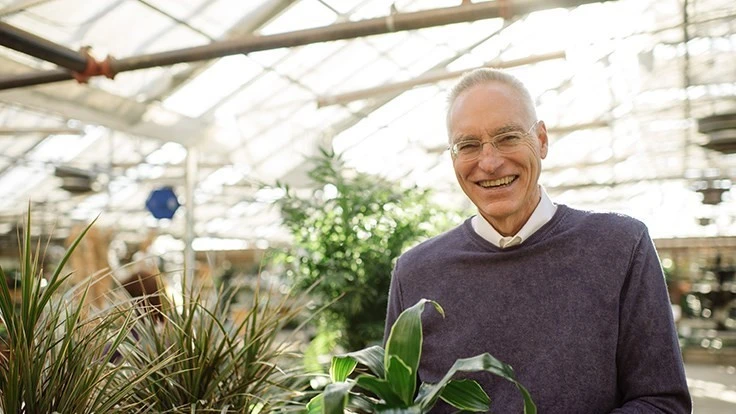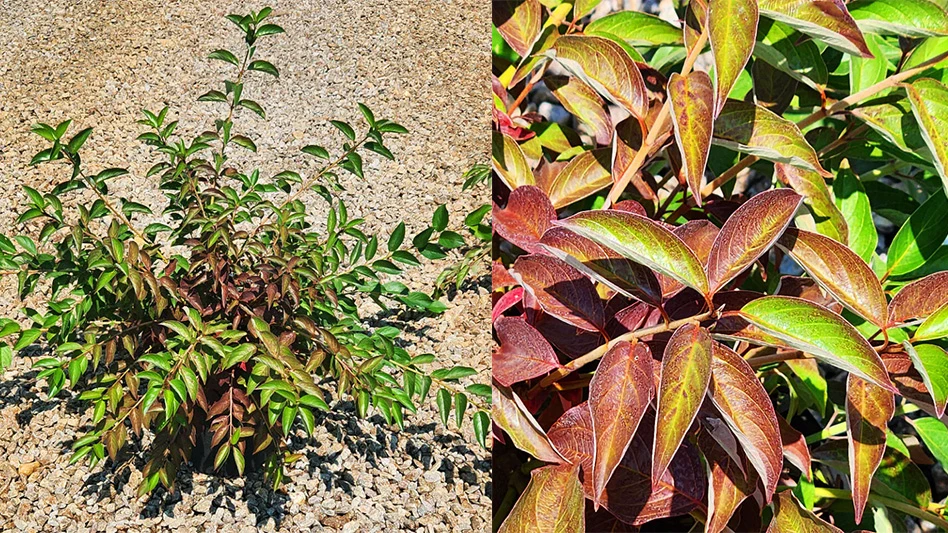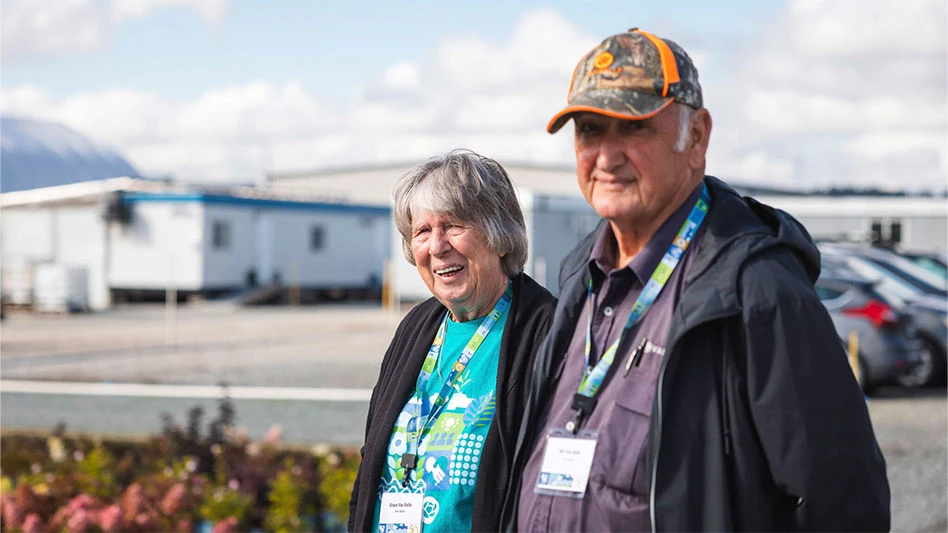
Photo: Dale Bachman in the Lyndale store, one of six Bachman's floral, gift and garden centers, in January 2016. Photo taken by Becca Dilley for Garden Center magazine.
In February, Dale Bachman, CEO of Bachman’s, based in Minneapolis, Minn., announced he was retiring Oct. 20, 2018, after a 46-year career working at the company his great grandparents founded 133 years ago. Bachman, a fourth-generation owner, will still resume his responsibilities as chairman of the board for the company, which operates retail locations in the Twin Cities, including six full-service floral, home, and garden centers, a floral and gift store in downtown Minneapolis, and 27 floral departments within Lunds and Byerlys grocery stores. Earlier this month, Bachman discussed his career and his post-retirement plans. Below is part one of our conversation. Look for part two next week, and read excerpts from our interview in the November issue of Garden Center magazine, featuring our State of the Industry report.
Garden Center: I know that you grew up in the business and graduated from the University of Minnesota, majoring in plant and soil science, but was there ever a moment you thought of doing something other than work in the family business?
Dale Bachman: I think I always knew that I wanted to work in the family business.
I’ve been thinking about those important points in time in somebody’s life, and for me it was really the importance of role models and mentors. I had great role models in my grandfather, Albert [Bachman, second-generation owner], and my dad, Larry [Bachman, third-generation owner] and my mom, Louise. My dad had asthma and allergies such that he couldn’t work in the greenhouse and needed to be outside. So, my grandfather started the nursery business during the war so that would be there for my dad after his return from service in the Air Force in WWII. Seeing the preparation my grandfather had done to have a landscape business ready for my dad when he came back from the war [was an inspiration].
GC: Who were your mentors?
DB: When I decided that I was going to go to the University of Minnesota, I was able to follow two [older] cousins; my cousin Todd [Bachman, who also served as CEO of Bachman's] and my cousin Craig [Bachman]. I had two good connections at the Department of Horticulture, but really it was Todd who was a mentor. We grew up next door to each other. When it was time for me to go to the University of Minnesota and study horticulture, Todd made the introductions on the academic side and as a member of Delta Theta Sigma, which is a social/professional agricultural fraternity. I pledged winter quarter of my first year at the university, and that was all because of Todd’s mentoring and guidance. And then it just continued here at Bachman’s. I guess for all those reasons, I always knew where I was headed.
GC: News about your retirement indicates you’ve worked at and led Bachman’s for nearly five decades, but I was thinking about how if you count time spent there as a child, as you mentioned, helping to empty waste baskets when you were 10 years old or spending summers working at the growing range, it really has been part of your everyday life for all of your life. How will your day-to-day change in retirement, and, other than maintaining the chairman of the board position, how do you plan to stay connected with the company?
DB: My day-to-day is yet to be determined, and I’ll figure that out. My intention would be to attend our peer group meetings and also Cultivate to stay connected and learn. I will be tracking the company’s progress as our board meetings take place and continue as chairman of the board. I still have strong connections to the University of Minnesota, and I would hope to take advantage of taking some classes at the university, too. And I intend to spend more time in the garden.
GC: What are you most looking forward to in your retirement?
DB: I think many things, one is to work on me instead of working on Bachman’s. I’d like to work on Dale … the idea of expanding and growing and trying to become better every day. I look forward to being less judgmental. It seems like in business we’re making judgments every day, and I would like to take a break from that and be more present in the moment.
 During a retirement party Oct. 19 organized in Dale Bachman's honor, Dale officially passed the "baton", a trowel with "Henry Bachman Sons Inc." on the handle that dates back to the 1920s or 1930s, to Susan Bachman West, president of the company and Dale's cousin. Dale retired as CEO on Oct. 20 but will continue serving as chairman of the board. Photo courtesy of Dale Bachman.
During a retirement party Oct. 19 organized in Dale Bachman's honor, Dale officially passed the "baton", a trowel with "Henry Bachman Sons Inc." on the handle that dates back to the 1920s or 1930s, to Susan Bachman West, president of the company and Dale's cousin. Dale retired as CEO on Oct. 20 but will continue serving as chairman of the board. Photo courtesy of Dale Bachman.
GC: Can you provide an example of how you plan to be more present and less judgmental?
DB: I was in church on Sunday [October 7], and the church has favored Bachman’s with some very nice landscaping opportunities, and just looking out at that garden yesterday and seeing the fabulous mums in color and hydrangea just blooming about as much as hydrangea can bloom. You just look at the landscape and the difference that it makes. This area had to be redone in significant ways for a variety of reasons. And you see the finished product, and it's a tremendous satisfaction that comes from looking at a completed project.
It's no different than when I was growing up and working alongside my dad. He said one of the greatest benefits to this hard work of nursery and landscape work is the satisfaction you get from the job well done. It's still true today.
I think that’s the advantage of winding down now, is you start to reflect on those opportunities and give them some thought. Because normally, you are grinding it out and moving on to the next one. Now there’s a little opportunity to take a breath.
GC: What will you miss most?
DB: I’m not planning to miss too much because I really do intend to stay connected, both with the people and the plants, so I don’t think I’m going to suffer from too much withdrawal. The good news is it will be a different relationship but hopefully one of more support and encouragement than anything else. But I do look forward to staying connected and visiting the stores and our production operations but visiting for different reasons.
GC: Reflecting back on your time at Bachman’s, what are you most proud of?
DB: It isn’t something that would be reflective on my work but the fact that we are in our 133rd year, I think we can all be thankful for that. That our guests, our customers, our team, the family has allowed us to be here for 133 years. You look at what Bachman’s has survived over the years, whether it was WWI or the depression or WWII and all the conflicts in between.
During the Great Recession, Stan Bachman (a third-generation family member) was still alive in those years. To talk to Stan about the issues around the Great Recession when we were living through it, and to hear people like a Stan Bachman, or even Gordie Bailey (of Bailey Nurseries, also third-generation family member, based in St. Paul, Minn.,) say this period of the Great Recession was probably in their estimation different than any other economic downturn than we have experienced in terms of its severity and duration, was helpful. The recognition that this Great Recession that we went through, both the magnitude of the downturn and the duration and the complexity of managing through something like that today, was significant. There are so many more moving parts today than there were, as Stan recalled, for what it took for his father’s generation to live through the Great Depression. Bachman’s was much smaller at the time. We were able to take care of the company and the family in the depression years.
GC: How did you get through the Great Recession?
DB: It took a tremendous amount, including sacrifice from the team. Those were difficult, difficult times, but with the whole team involved in the process, we made it through and began to grow again. We're really tremendously thankful that we came out on the other side. Business is fragile, especially for our segments -- landscape, garden center, production -- nothing is a given these days.There are probably easier ways to make a living than in our industry, but we go into it for lots of good reasons. And it's still one of the finest occupations and industries that you're going to find in the country.
Editor’s Note: Interview has been edited for length and clarity. Look for the rest of our interview with Dale Bachman next week and excerpts from our conversation in the November State of the Industry issue.
Latest from Garden Center
- Sakata Seed America announces executive leadership transition
- Syngenta Flowers launches updated Sunfinity consumer website
- Star Roses and Plants adds four members to sales team
- Super Charged Moon Juice from Moon Valley Nurseries now available nationally
- Terra Nova Nurseries releases new agastache variety, 'Peach Pearl'
- Blackmore Company creates plastic-free Plant-It-Friendly retail sleeve
- PlantCon International expands to Florida
- Time lapse: 2025 Axiom Gardening Outlook Study finds generational trends





